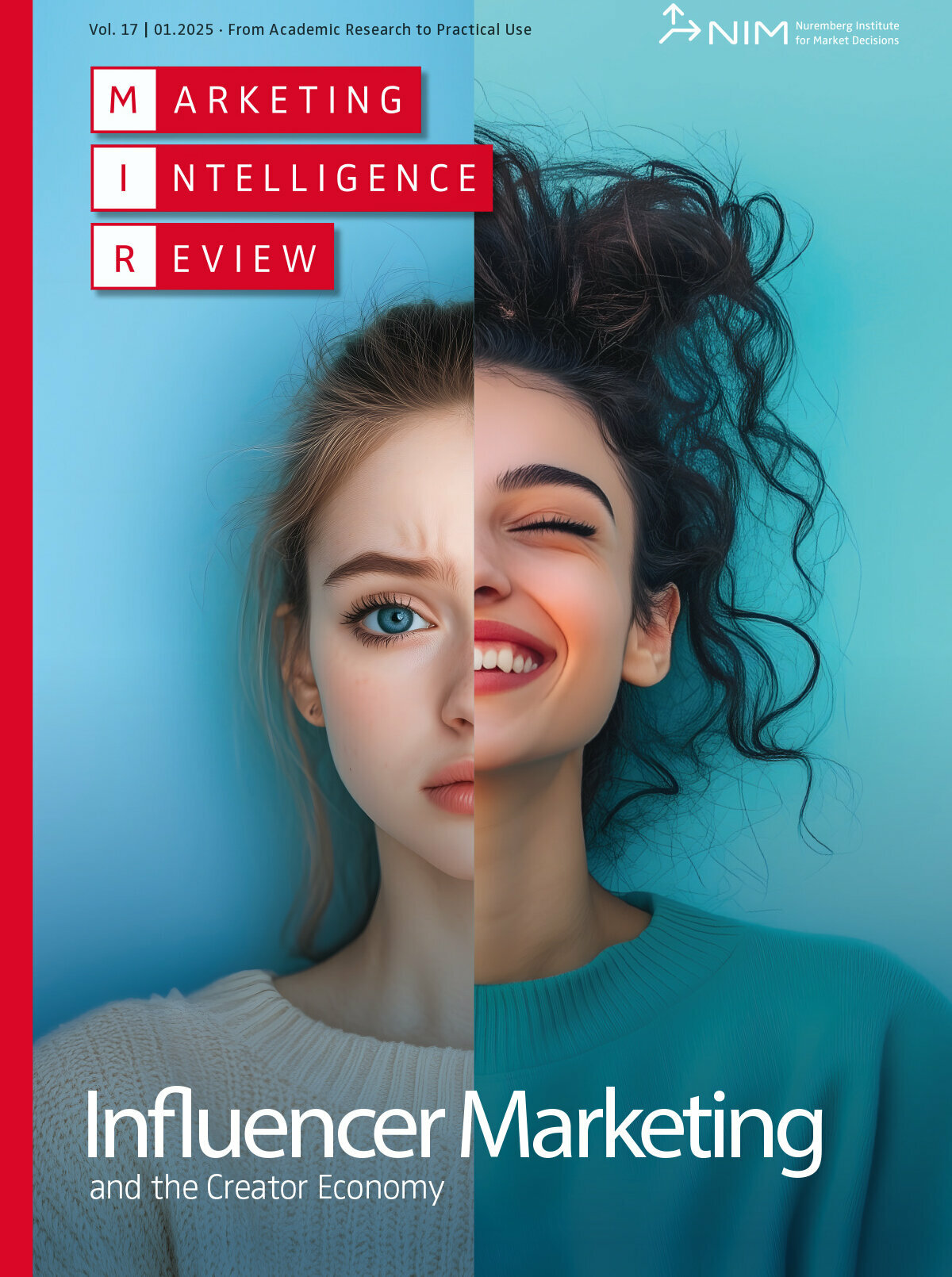From Mundane to Creative: How AI Unburdens Sales Agents
Teaming up with AI
Many organizations envision AI as a partner that enables human employees to focus on higher-level problem solving. AI and employees have the potential to compensate for each other’s weaknesses and generate complementarity, or “augmented intelligence.” One speculation is that AI could increase employee creativity, with bots taking care of the heavy lifting so that humans can focus on the creative aspects. However, AI assistance can also have negative effects. Human employees might grow concerned about being replaced or having to face an increased workload when tasks become more challenging.
AI assistance can enhance creativity and productivity, but its impact is skill-biased.
Promising AI potential in sales
A promising field for the joint work of humans and AI is sales. AI could handle repetitive and time-consuming tasks like data entry, lead qualification and appointment scheduling. This would allow human sales professionals to concentrate on high-value, creative activities like building relationships with clients and closing deals, ultimately improving efficiency and productivity. To gain more insights into the effects of AI support on the creative potential and performance of sales agents, we cooperated with a major telemarketing company in a field experiment (Box 1). The task involved making outbound calls to sell credit cards to customers and a sequential division of labor. The first part of the experiment comprised generating sales leads, a well codified activity that an established AI conversational bot technology could perform. The second part involved persuading these sales leads to make purchases, which the human sales agents performed.
How sales agents evaluate AI assistance
Despite all groups of agents performing better in their sales calls when AI was involved, the interviews revealed remarkable differences in how AI was perceived by top performers in contrast to less skilled sales agents.
> AI assistance altered job roles
Without AI assistance, sales agents considered lead generation to be hard labor as they rarely had real communications with customers. Agents spent most of their time trying to get connected, dealing with hang-ups and having very short conversations if customers even took their calls. With AI assistance in probing initial interest of customers, actual conversations with customers reached almost 100%. These changes increased efficiency but also the intensity and challenges of agents’ work. Interestingly, highly skilled and lower-skilled agents reported a drastically different impact of this change on their work performance and psychological well-being. Although highly skilled agents also recognized that with AI assistance, the difficulty of their work increased, they considered it beneficial to their efficiency and performance, and they reported feeling elated because this new work mode significantly improved their work. Conversely, lower-skilled agents considered the change to have lowered their speed and efficiency at work because with increased AI assistance they encountered more serious customers who were more challenging to serve. Owing to their limited abilities, the lower-skilled agents experienced many difficulties in persuading customers to move forward with a purchase.
> Only highly skilled employees were able to use the freed-up time to develop more creative solutions
Agents at all skill levels agreed that increased interaction with customers provided valuable feedback, leading to the potential for better, context-appropriate solutions and that it enhanced their creative potential for new scripts in unique situations. However, there was a sharp divergence between highly skilled and lower-skilled agents. The highly skilled employees benefited directly from AI assistance because it allowed them to focus more on problem solving and developing innovative scripts, leading to improved outcomes in handling challenging customer questions. Conversely, the lower-skilled agents felt overchallenged and were unable to find new or better answers or more innovative solutions during the additional time. However, they felt that they might benefit from the scripts that higher-performing colleagues developed.
The findings of the study indicate that agents with AI assistance were significantly more successful in answering untrained customer questions than those without AI assistance.

> Highly skilled employees experienced more positive emotions
Both groups expressed positive sentiments regarding the company’s adoption of AI, viewing it as a sign of technological advancement and strategic vision. This sentiment was driven by a sense of pride, recognition of their job skills and the perception of enhanced organizational support. The perceived emotions and morale, however, diverged between highly skilled and lower-skilled agents. Highly skilled agents experienced positive emotions, including improved mood, higher morale and increased passion and engagement with customers willing to make purchases. Positive emotions also contributed to improved creativity. In contrast, lower-skilled agents reported negative emotions such as nervousness, demoralization and feelings of rejection, largely due to the increased complexity of tasks and the pressure to persuade challenging customers. Despite recognizing the potential threat of AI replacing their roles in the future, most employees remained supportive of the company’s adoption of AI, highlighting a willingness to adapt and grow in response to technological advancements.
> Highly skilled employees achieved better results and favored additional AI support
Highly skilled agents attributed improved performance, characterized by higher efficiency and quality, to AI assistance and experienced a positive impact on meeting key performance indicators (KPIs). Lower-skilled agents expressed frustration with reduced success in persuading sales leads. These performance perceptions indeed aligned with analytical results of sales performance. Most highly skilled agents advocated for expanding the use of AI to handle less effective calls and actively contributing to updating the AI’s knowledge bank with their script innovations. In contrast, many lower-skilled agents preferred maintaining the current level of AI assistance, expressing concerns about increased difficulty in handling tasks if AI expansion continued.
Complementary action to support the success of AI assistance
Our study demonstrates that it is possible to use AI-human collaboration to increase employee creativity and productivity. The sequential division of labor between AI and human employees as used in our setting was welcomed by most sales agents but did translate into increased performance only for some: AI-augmented creativity and productivity is skill-biased. Employees’ job skills critically shape their cognitive abilities and psychological outcomes, which are conducive to creativity and higher-level problem-solving. Therefore, companies introducing AI should plan complementary measures to leverage AI’s full potential.
AI assistance increased efficiency but also the intensity and challenges of sales agents’ work.
> Upskill and motivate sales agents
In our interviews, lower-skilled agents called for more training and sharing experiences with highly skilled colleagues to help them adapt. They experienced “double loss” – from the lack of job skills per se and negative experience working in a team with AI. It is important not to ignore these experiences and requests, as many low-skilled employees can grow to develop greater job skills in the future. Therefore, the introduction of any AI should include additional training in domain knowledge sales skills, particularly for agents who lack skills or are less experienced. Since low job skills lead to “double loss,” elevating job skills generates double returns for employees and their company. Another type of complementary policy might be to create incentives for successful AI integration in the sales process and to develop routines where higher-skilled employees regularly share the creative outcomes generated under AI assistance.
> Clearly communicate the purpose and scope of the intended use of AI
All agents recognized the threat of eventually being replaced by AI and described mixed feelings concerning the help they received from AI. To reduce agents’ concerns, managers should clearly communicate the intended scope of AI implementation: In our case, the purpose was to follow clear scripts and accomplish easy, repetitive tasks and not to interact with customers in real, unscripted sales conversations. If this is made clear, agents might be less worried about having to compete in a “horse race” with AI. Being alleviated from concerns about being replaced might further motivate agents to use the full potential of AI for their own and their company’s benefit.
Summing up, AI assistance can be added to the toolbox that enables employees to solve problems in a novel and useful manner, thereby improving creativity and productivity at work.
FURTHER READING
Jia, N., Luo, X., Fang, Z., & Liao, C. (2023). When and How Artificial Intelligence Augments Employee Creativity. Academy of Management Journal, 66(4). doi:10.5465/amj.2022.0426










